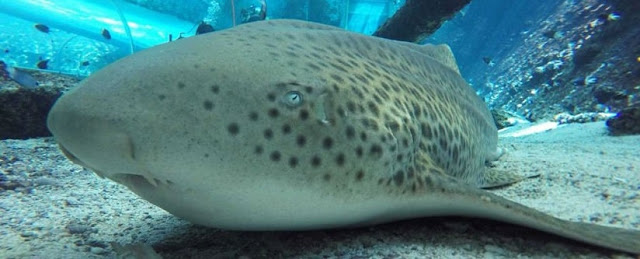A zebra shark (Stegostoma fasciatum) in Australia has become the first recorded case of a shark switching from sexual to asexual reproduction.
In April last year, Leonie gave birth to three pups called Cleo, CC, and Gemini in a Queensland aquarium. This sweet but otherwise unremarkable tale would have gone unnoticed by the science world if it weren’t for one key detail: Leonie hadn’t mated with a male shark since 2012.
Her previous breeding partner, Leo – with whom she had produced more than 20 offspring – was moved to a new tank at the aquarium in 2013. Leonie hadn’t shared a tank with any other males in that time, meaning the three pups delivered in 2016 came as something of a surprise.
“We thought she could be storing sperm but when we tested the pups and the possible parent sharks using DNA fingerprinting, we found they only had cells from Leonie,” says biomedical researcher Christine Dudgeon from the University of Queensland.
So how is this possible?
Well, sharks breeding asexually is extremely rare, but isn’t entirely unheard of.
This is possible because, beyond sexual reproduction, there’s another way that certain species can asexually reproduce, called parthenogenesis.
This process allows embryos to develop without being fertilised like they are in sexual reproduction.
Parthenogenesis mainly occurs in plants and invertebrate animals, but these ‘virgin births’ have also been documented in vertebrate animals, including sharks and lizards.
But what makes Leonie’s case so unusual is it’s the first time scientists have seen a shark make the switch from breeding sexually to asexually.
In other circumstances where sharks have been observed to breed parthenogenetically, the animals did not have any experience with sexual reproduction, having bred asexually from maturity.
In fact, this is only the third time scientists have seen any species make the switch back to asexual reproduction from past sexual experience, with the other cases being an eagle ray and a boa constrictor, both held in captivity.
And this time around, captivity again looks to have been responsible for the change in Leonie’s circumstances.
The aquarium decided to deprive Leonie of of her mate, Leo, because they’d been producing too many offspring for the staff to handle.
“Leonie adapted to her circumstances and we believe she switched because she lost her mate. What we want to know now is could this occur in the wild and, if so, how often does it?” says Dudgeon.
“One reason why we haven’t seen it before could be because we haven’t been looking for it. It might be happening in the wild, but it’s never been recorded in this species before.”
But while the ability to breed independently could be an invaluable survival mechanism in the absence of suitable mates, it comes with its own set of problems: the resulting pups suffer in terms of genetic diversity, not picking up any of the absent male’s genes, and only receiving half of their mother’s.
“This is an extreme form of inbreeding,” Dudgeon told Casey Briggs at the ABC.
“[I]t’s unlikely to be a very good long-term strategy, because eventually they need to mix up that gene pool and increase that genetic diversity to adapt to new and ever-changing conditions.”
But in the short term, it may be that the process can preserve as much of an animal’s genetic identity as possible (if only half in total) until breeding conditions become more favourable.
“It might be a holding-on mechanism,” Dudgeon told Alice Klein at New Scientist. “Mum’s genes get passed down from female to female until there are males available to mate with.”
To find out if that’s the case, the researchers now plan to follow the pups until they reach maturity themselves, to find out if Cleo, CC, and Gemini are capable of breeding with males when their time comes.
Let’s hope so, because if they can, it would be evidence that these sharks have evolved an amazing ability to keep surviving, even when they’ve been pushed into a tight corner.
And with zebra sharks being listed as endangered on the IUCN Red List of Threatened Species, these animals need all the survival help they can get.
***
The findings are published in the nature research journal – Scientific Reports.




God's wonderful work!